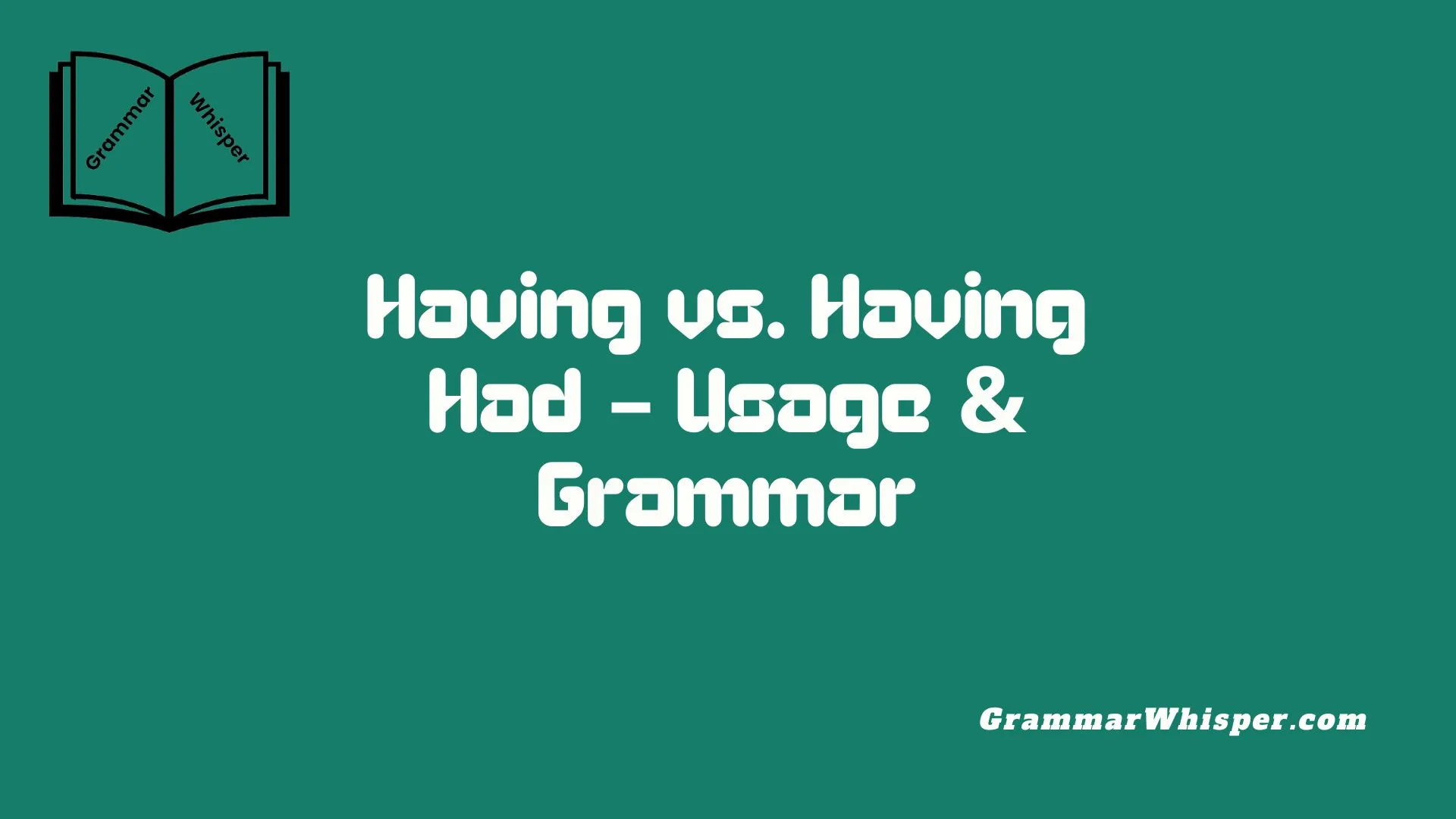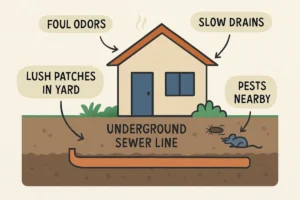The difference between Having vs. Having Had may seem small, but it makes a big impact in real writing. Though they look similar, their grammar role shifts based on usage and time. I’ve watched students on their learning journey experience a clear breakthrough once they understood the meaning behind each. Having describes actions still tied to the present, while Having Had signals something finished before another event in the past. That subtle, but important, shift adds sharpness to your writing. It helps express thought with more precision – something I’ve found essential when editing or coaching. Understanding this gives your prose clarity, and even a basic sentence can instantly elevate when the right form is used.
Let me sprinkle in a few real-world examples to make it click. “Having breakfast before work helps me focus” implies the habit is ongoing. But “Having Had breakfast, I felt ready for my meeting” clearly shows the act happened before another past action. That’s the nuance. It may seem technical, but knowing which to use and when adds depth to your expression. The different ways you can use them aren’t just theoretical – they come alive once you start seeing how often they appear in fluent speech and text. Once you grasp the pattern, you’ll write with more confidence and clarity. It’s about seeing the form and function and letting them shape your message with purpose.
What Does “Having” Mean in English Grammar?
“Having” acts as both a gerund and a perfect participle.
As a gerund:
It turns a verb into a noun-like entity:
- Having courage matters.
- I enjoy having breakfast early.
As a perfect participle (in perfect constructions):
It connects two actions, usually when one is ongoing or simultaneous:
- Having read the report, she asked insightful questions.
- They left, having completed the project.
When “having” stands alone, it often describes an action that’s either present or just finished. It’s great to signal two linked moments.
Table: Common “having” structures
| Form | Meaning | Example |
| Having + base verb (gerund) | Action as a noun | Having fun keeps me energized. |
| Having + past participle | Completed action before next one | Having eaten, he went for a walk. |
Notice how we speak of actions rather than timeframes here. That makes “having” versatile and conversational.
What Does “Having Had” Mean?
“Having had” is a perfect participle of “have”. It’s more advanced, but here’s the core: it shows that you completed one action before performing another.
For example:
- Having had breakfast, she left for work. (Breakfast → left for work; chain of events)
While the phrase repeats “have,” it doesn’t mean redundancy. Instead, it clarifies the sequence.
Why it isn’t redundant:
- “Have had” in the perfect tense signals possession or experience.
- Used in the perfect participle, “having had” makes that action sound finished before the next begins.
Table: “Having” vs. “Having Had” comparison
| Phrase | Sequence | Example |
| Having eaten | Ongoing/Simultaneous | Having eaten, he reads the newspaper. |
| Having had eaten | Completed before another action | Having had breakfast, she started her day. |
In real use, though, “having had eaten” is awkward – we use “having eaten” instead. The key is matching “have” properly.
Differentiating “Having” vs. “Having Had”
They look similar but serve different storytelling needs:
- “Having” speaks of a single action, possibly simultaneous or just completed by the subject.
- “Having had” places one action clearly before another, often in formal or structured writing.
Examples side by side:
- Having worked all day, she took a rest.
- Having had worked all day… (awkward and incorrect)
The second example fails because “working” isn’t complete until the rest happens. So, don’t force “having had” where it doesn’t belong.
List: Key distinctions
- Time relation: “Having” hints at beginning or duration; “having had” implies full completion.
- Clarity: Use “having had” when you need to show clear sequence.
- Context: In casual speech, “having” often suffices.
When Is “Having Had” Necessary?
Don’t force it into everyday writing. But in these cases, it shines:
- Highlighting completion before another event Example: Having had the vaccine, she felt relief.
- Avoiding ambiguity “Having eaten” could mean during or before dinner; “having had eaten”? Formal but rarely used. Better: Having had breakfast.
- Formal and academic importance Writers use it to add precision in reports or studies.
Rewrite table: informal vs. formal
| Informal phrase | Formal alternative |
| After I ate, I felt full. | Having had a meal, I felt full. |
| After she spoke, she paused. | Having spoken, she paused. |
The formal side uses participles to compactly express chronology with poise.
Common Errors with “Having” and “Having Had”
English learners stumble on a few pitfalls:
- “Having” vs. “having had” confusion: Example:
- Incorrect: Having had completed my work…
- Correct: Having completed my work…
- Direct translation mistakes: Some languages use perfect tense differently and confuse learners.
- Overusing “having had” informally: Too formal for everyday chat. Keep it simple.
Example quiz: Which is right?
- (Having / Having had) finished all tasks, she relaxed. → Having finished all tasks (tasks complete before relaxing)
- (Having / Having had) breakfast, he went jogging. → Having had breakfast
Formality & Context: When Each Form Is Preferred
Which version suits which setting?
- Academic writing: Use both forms thoughtfully to show time relationships.
- Business writing: Prefer “having finished” or “having had” based on nuance.
- Creative writing: Less formal, but writers sometimes use “having” to pair actions smoothly.
- Casual speech or blogging: Simpler: just use happened-before connectors like “after” or “once.”
Table: Best-fit scenarios
| Context | Preferred Form |
| Formal report | Having had a deep conversation, we… |
| Blog post | Having posted, I noticed the comments |
| Short story | Having walked miles, she paused |
| Daily conversation | After I’d eaten, I felt better |
Knowing your reader and tone guides form selection every time.
The Grammar Behind It: Perfect Participle Explained
Perfect participle = having + past participle
It shows that an action happened before another one. That’s why “having had” exists.
Why it matters:
- It creates complex sentences elegantly.
- It saves repetition of full dependent clauses.
Examples with different verbs:
- Having eaten, she was ready.
- Having spoken, he left.
- Having slept, they started early.
In all cases, the first action ends, and then the next begins.
Mastering the Use of “Having” vs. “Having Had”
Let’s build your practical toolkit:
✔️ Do’s:
- Use having + past participle to link two actions.
- Use having had when focusing on the earlier action.
- Read your sentence aloud – if it sounds heavy, simplify.
❌ Don’ts:
- Don’t use “having had” for things not completed beforehand.
- Don’t use it just to sound formal.
- Avoid mixing simple, perfect, and gerund forms randomly.
Practice drill: Rewrite these:
- I finished cooking, then I went out.
- After she read the letter, she cried.
Answers:
- Having cooked, I went out.
- Having read the letter, she cried.
Real-Life Examples and Use Cases
Here are real sentences from literature and respected publications:
- Having had some practice with the technique, the artist achieved stunning results. – Used in The New York Times.
- Having spoken with the client, we finalized the proposal – From a business email template.
Diagram: (verbal)
- First action → second action
- Having had introduction [completion] → main clause.
These sentences showcase how writers express timing concisely.
Final Thoughts
Learners often make these mistakes:
- Translating too literally from their native language.
- Misplacing “having” or forgetting completion status.
Tips for teachers:
- Use timelines and charts to show action order.
- Create fill-in-the-blank exercises with “having…”
- Pair sentences and explain the difference.
Practice table: Fill the blank
| Prompt | Correct answer |
| ___ eaten breakfast, I felt ready | Having eaten |
| ___ had studied hard, she aced the exam | Having had |
| ___ spoken to him, she wrote the summary | Having spoken |
Explain each answer to reinforce learning.
FAQs
Is “having had” grammatically correct?
Yes, it’s a valid perfect participle form expressing completed action before another.
Can “having” open a sentence?
Absolutely. Example: Having studied all night, she felt prepared.
When does “having had” sound redundant?
When completion isn’t needed or obvious. Example: Having had gone is wrong; better: Having gone.
Can they be interchangeable?
Rarely. They’re not interchangeable because they show different timings.











